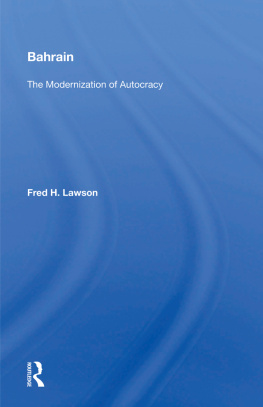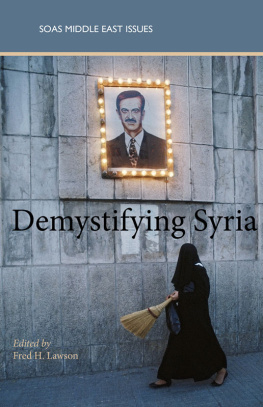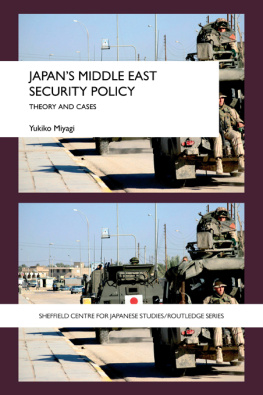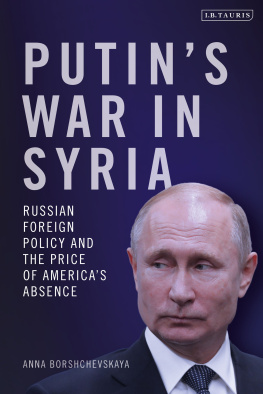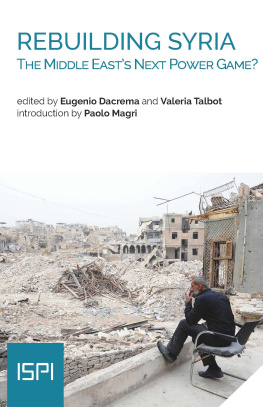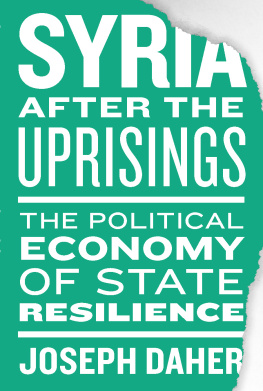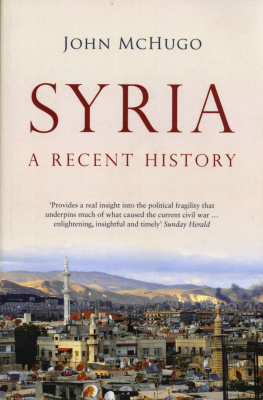Fred H. Lawson - Global Security Watch—Syria
Here you can read online Fred H. Lawson - Global Security Watch—Syria full text of the book (entire story) in english for free. Download pdf and epub, get meaning, cover and reviews about this ebook. year: 2013, publisher: ABC-CLIO, genre: Politics. Description of the work, (preface) as well as reviews are available. Best literature library LitArk.com created for fans of good reading and offers a wide selection of genres:
Romance novel
Science fiction
Adventure
Detective
Science
History
Home and family
Prose
Art
Politics
Computer
Non-fiction
Religion
Business
Children
Humor
Choose a favorite category and find really read worthwhile books. Enjoy immersion in the world of imagination, feel the emotions of the characters or learn something new for yourself, make an fascinating discovery.

- Book:Global Security Watch—Syria
- Author:
- Publisher:ABC-CLIO
- Genre:
- Year:2013
- Rating:4 / 5
- Favourites:Add to favourites
- Your mark:
- 80
- 1
- 2
- 3
- 4
- 5
Global Security Watch—Syria: summary, description and annotation
We offer to read an annotation, description, summary or preface (depends on what the author of the book "Global Security Watch—Syria" wrote himself). If you haven't found the necessary information about the book — write in the comments, we will try to find it.
Global Security Watch—Syria — read online for free the complete book (whole text) full work
Below is the text of the book, divided by pages. System saving the place of the last page read, allows you to conveniently read the book "Global Security Watch—Syria" online for free, without having to search again every time where you left off. Put a bookmark, and you can go to the page where you finished reading at any time.
Font size:
Interval:
Bookmark:
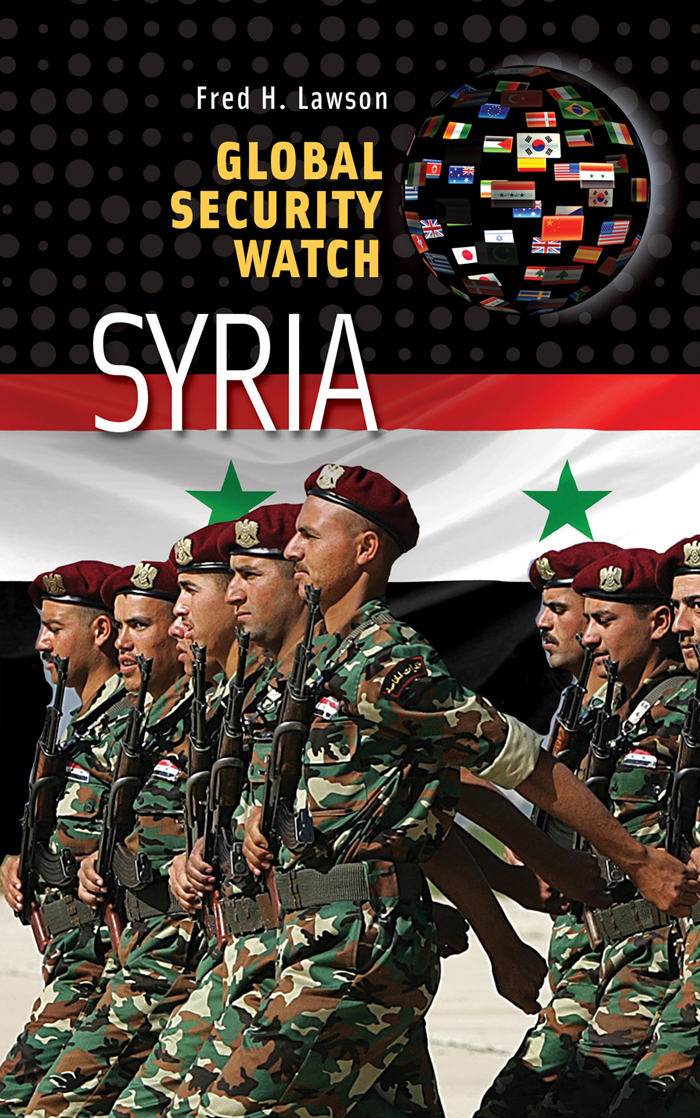
Recent Titles in Global Security Watch
Global Security WatchTurkey
Mustafa Kibaroglu and Aysegul Kibaroglu
Global Security WatchRussia
Richard Weitz
Global Security WatchLebanon
David S. Sorenson
Global Security WatchThe Caucasus States
Houman A. Sadri
Global Security WatchKenya
Donovan C. Chau
Global Security WatchJordan
W. Andrew Terrill
Global Security WatchJapan
Andrew L. Oros and Yuki Tatsumi
Global Security WatchSudan
Richard A. Lobban, Jr.
Global Security WatchCentral Asia
Reuel R. Hanks
Global Security WatchPakistan
Syed Farooq Hasnat
Global Security WatchVenezuela
Daniel Charles Hellinger
Global Security WatchIndia
Amit Gupta
FRED H. LAWSON

Copyright 2013 by Fred H. Lawson
All rights reserved. No part of this publication may be reproduced, stored in a retrieval system, or transmitted, in any form or by any means, electronic, mechanical, photocopying, recording, or otherwise, except for the inclusion of brief quotations in a review, without prior permission in writing from the publisher.
Library of Congress Cataloging-in-Publication Data
Lawson, Fred Haley, 1952
Global security watchSyria / Fred H. Lawson.
p. cm. (Global security watch)
Includes bibliographical references and index.
ISBN 9780313359576 (hardback) ISBN 9780313359583 (ebook)
1. SyriaStrategic aspects. 2. SyriaForeign relations1971 3. SyriaPolitics and government2000 I. Title. II. Title: Syria.
DS98.6.L39 2013
956.91042dc23 2012035439
ISBN: 9780313359576
EISBN: 9780313359583
17 16 15 14 13 1 2 3 4 5
This book is also available on the World Wide Web as an eBook.
Visit www.abc-clio.com for details.
Praeger
An Imprint of ABC-CLIO, LLC
ABC-CLIO, LLC
130 Cremona Drive, P.O. Box 1911
Santa Barbara, California 93116-1911
This book is printed on acid-free paper 
Manufactured in the United States of America
Geoffrey Schad drew up an initial version of the Chronology for a projected reference volume on Syria that I had hoped the Syrian Studies Association would put together. Mary Ann Wight wrestled the map into shape. I am grateful to both for providing readers with important information in readily accessible ways.
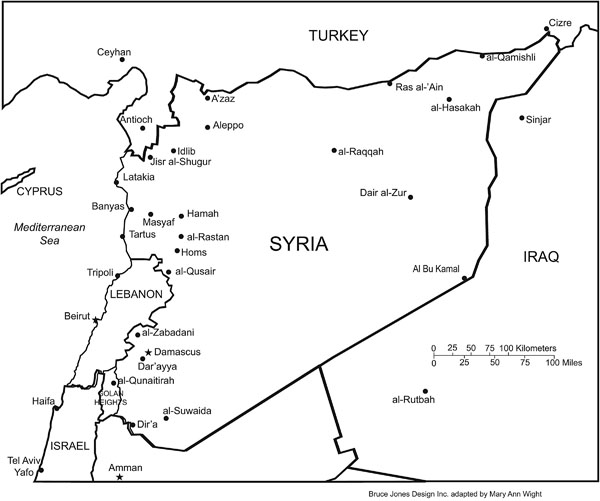
During the first week of July 2012, the Syrian navy carried out large-scale exercises involving warships, attack helicopters, and land-based missiles. The purpose of the maneuvers, according to Syrian state television, was to defend Syrias shores against any possible aggression.
Taken together, these snapshots illustrate the broad range of threats that confronted Syria during the summer of 2012. Some of these threats came from outside the countrys borders, as Syrian officials never missed an opportunity to point out. President Bashshar al-Asad told German television on July 8, for instance, that the violence that had engulfed Syria was the work of gangs, different kinds of gangs, whose activities were sponsored and funded by Turkey, Saudi Arabia, Qatar, and the United States. The likelihood of an armed clash with Turkey did indeed seem high at that particular moment, barely a week after the Syrian armed forces had shot down a Turkish reconnaissance aircraft that was flying just outside Syrian airspace.
Other threats facing the country were largely internal. A severe and persistent drought had decimated agricultural production in the years after 2008 and had driven thousands of rural laborers to shantytowns on the outskirts of the cities in search of work and sustenance. An influx of imported manufactured goods from Turkey, and increasingly from the Peoples Republic of China as well, had ruined local industry and left large numbers of workers, especially in the inefficient state-run companies, with little hope of secure employment. As in other countries of the Arab world, policies that deregulated the market and encouraged the expansion of private enterprise severely disrupted long-established patterns of production and accumulation without generating sustained growth in their place.
Strategic and economic threats paled in comparison with the popular discontent that exploded into violence in the spring of 2011. Unlike Tunisia and Egypt, where the military and security forces for the most part restrained themselves in the face of widespread public disorder, Syria exhibited a more familiar and predictable pattern in which troops and proregime thugs almost immediately resorted to force to disperse and punish the protesters. Scattered groups of soldiers who refused to comply with orders to shoot at unarmed civilians formed popular militias and turned their meager weapons against the authorities. By the eighth month of the uprising, Syria had descended into civil war.
Students of security studies have suggested two different ways to make sense of all this. One way is to explore the connections between foreign and domestic threats. The most influential example of this kind of analysis is Steven Davids discussion of external and internal balancing. David argues that highly vulnerable leaderships can be expected to be equally worried about foreign and domestic threats and will take steps that can counteract both kinds of threats simultaneously. Specifically, leaders do their best to break up the coalition of external and internal forces that challenges their position, most often doing so by split[ting] the alignment against them and focus[ing] their energies on their most dangerous (domestic) opponents. To do this, David continues, they appease the international allies of their domestic opponents. David labels this strategy omnibalancing.
Students of Middle East politics have found Davids concept of omnibalancing to be highly attractive. Most leaderships across the region confront serious threats from foreign and domestic challengers, usually at the same time; great powers have often formed close partnerships with local actors to carry out their global objectives; states in the region are widely believed to be recent creations that lack fundamental legitimacy as political entities; and the very term omnibalancing has connotations that resonate with the complex alliance behaviors that can be observed in this part of the world. The notion has therefore been applied to countries as diverse as Saudi Arabia,
Applications to Middle Eastern cases tend, however, to use the concept of omnibalancing in ways that drain it of most of its explanatory power. On one hand, the concept has been extended far beyond its original theoretical domain and has been applied to all kinds of foreign and domestic outcomes, not just to why states sometimes change strategic partners. Hillel Frisch, for example, uses omnibalancing to explain why so many monarchies continue to exist in the Arab world.
An alternative way to comprehend the multiple threats that confront contemporary Syria is to differentiate between state security and regime security. This analytical distinction inspired a substantial academic literature during the early 1990s but failed to generate a sustained research program. Early proponents of the concept of regime security hypothesized that leaders exert greater effort to retain power than they do to defend or further the interests of the country as a whole. As domestic challenges gain momentum, the incentives for a beleaguered leadership to put its own political survival above those of the nation become too strong to resist. This line of argument, like the concept of omnibalancing, was developed with special reference to comparatively weak, poor states and was quickly adopted by scholars concerned with the Middle East.
Font size:
Interval:
Bookmark:
Similar books «Global Security Watch—Syria»
Look at similar books to Global Security Watch—Syria. We have selected literature similar in name and meaning in the hope of providing readers with more options to find new, interesting, not yet read works.
Discussion, reviews of the book Global Security Watch—Syria and just readers' own opinions. Leave your comments, write what you think about the work, its meaning or the main characters. Specify what exactly you liked and what you didn't like, and why you think so.

